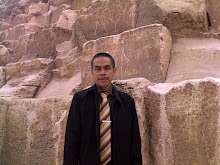THE SIGNIFICANCE OF SUBSTANTIVE DEMOCRACY
AGAINST ABUSE OF POWER
Abd A‘la
Abuse of power is one of dominant phenomena that we stumble on almost everywhere in
The “end” of those is the pervasiveness of corruption and other dirty practices. It is almost no more institutions free of that evil practices that actually will destroy the people and this country. Even the institution managing issues related to religious affairs is almost alike.
Ironically, the public appears to let the dirty practices happen. Even many of them join in those acts by taking a short cut every time they deal with the bureaucracy. In their simple reasons, instead to get through winding roads, they choose to cut the line. For without doing so, they involved in a complicated business.
All of that show the morality degradation in the life of the nation. Noble values such honesty, responsibility, and the alike begin to disappear and place with boosting of ambition, greed, and pragmatic attitudes.
Hypocrisy
In this situation, the phenomenon of life, especially in public spaces, was full of ambivalence. Communities, especially their elites, have turned the reality upside down from which the appearance on the surface does not represent the fact. Crime has been seen as kindness, and vice versa.
Thus, it has nearly became a very normal scene when we saw someone who looked a day-to-day as a figure always preached about the importance of moral, suddenly did practices in contrast with the discourses he/she spoke out. Similarly, a formal leader appeared very devoted because he/she run diligently religious rituals in public areas suddenly engaged in mega-corruption.
In accordance with that situation, the other elites handling the problem accomplished their duty in concealment. Even in a wider level, the public institutions run a system tending to that concealment in directing all of the public affairs. They did transparency only in so formalistic and purely administrative manner. They did not lied responsibility based on morality and the substance of its meaning as a form of maintenance and development of trust from the people and the community. Thus, the action appeared to be much different with the actual goal, so that the cases are rarely can be completed in its true sense.
Responding to those practices, some people appeared half-hearted resistance. They seemed not to be so sensitive to the hazard of this moral deprivation. The resistance movements against the practice was often only in a glance, sporadic, and more artificial demonstrative one not attaching on the responsible moral commitment.
It may occur, in part, because they were going to take narrow and pragmatic benefits, both from the distorted practices or from their actions did.
To a certain degree, it showed that hypocrisy have been infecting some of people’s and the powering-elites’ attitudes and behaviors. Since there is great gap between the phenomenon and the factual reality, which in turn it will spoil not only the perpetrators, but also the state and the people as a whole.
Substantive Democracy
The explanation above highlights that the resistance movement against the abuse of power must be actually accompanied with the development of a holistic system emphasizing on openness in all public institutions both the governmental and the other ones, including NGOs and community itself. Thus, the people could access and know the performance of each exactly and accurately. Besides, one to another could carry out mutual supervision.
Along with that policy, the law should be stand on the values of justice so that it can reach all of the people and all institutions, and could treat all of them equally. In this context, the law enforcement agencies are required to develop a system that truly can touch the sense of justice, in which is no room to provide an opportunity for anyone to distort the law towards something in contrast with the values of substantive justice that principally is the right for every one. At the same time, anyone who violates the law, he/she should get reward according to the values of justice, without an expense of others who are not guilty.
At this point, it lays the actual urgency for the state to develop a substantive democracy, which is not simply glued on the formal democratic procedures and symbols.
Since the core of democracy is the people, justice, equality, and alike, the public areas absolutely belongs to their own which they must manage openly and fairly. In this framework, transparency becomes one of the cores of democracy as well. Because without transparency the public space as their own from which they are responsible to maintain will only become pseudo-available.
Consecutively, the transparency requests honesty, responsibility, fairness, and ethical-moral alike from all of nation elements, including from the communities themselves. Without all of these values, the people will be the object of certain people and groups interests; and at the same time, the public will never be mature and wise. Crimes that harm the country and people will continue to be in progress.
Moreover, transparency will put whom known for her/his integrity into a perpetual strivings to maintain consistently her/his ethical-moral. For every time, there is an opportunity to depart, the public will know and take control as early as possible. Therefore anchoring values of substantive democracy will make the noble morality become system not only for personal, but also for institutional.
That is the agenda we need to develop seriously and to implant into reality of the nation life from now on©.







1 comment:
Saporanah, Kaktoan. Abdina terro akomentara, keng pas usa mikol kamus...
Post a Comment